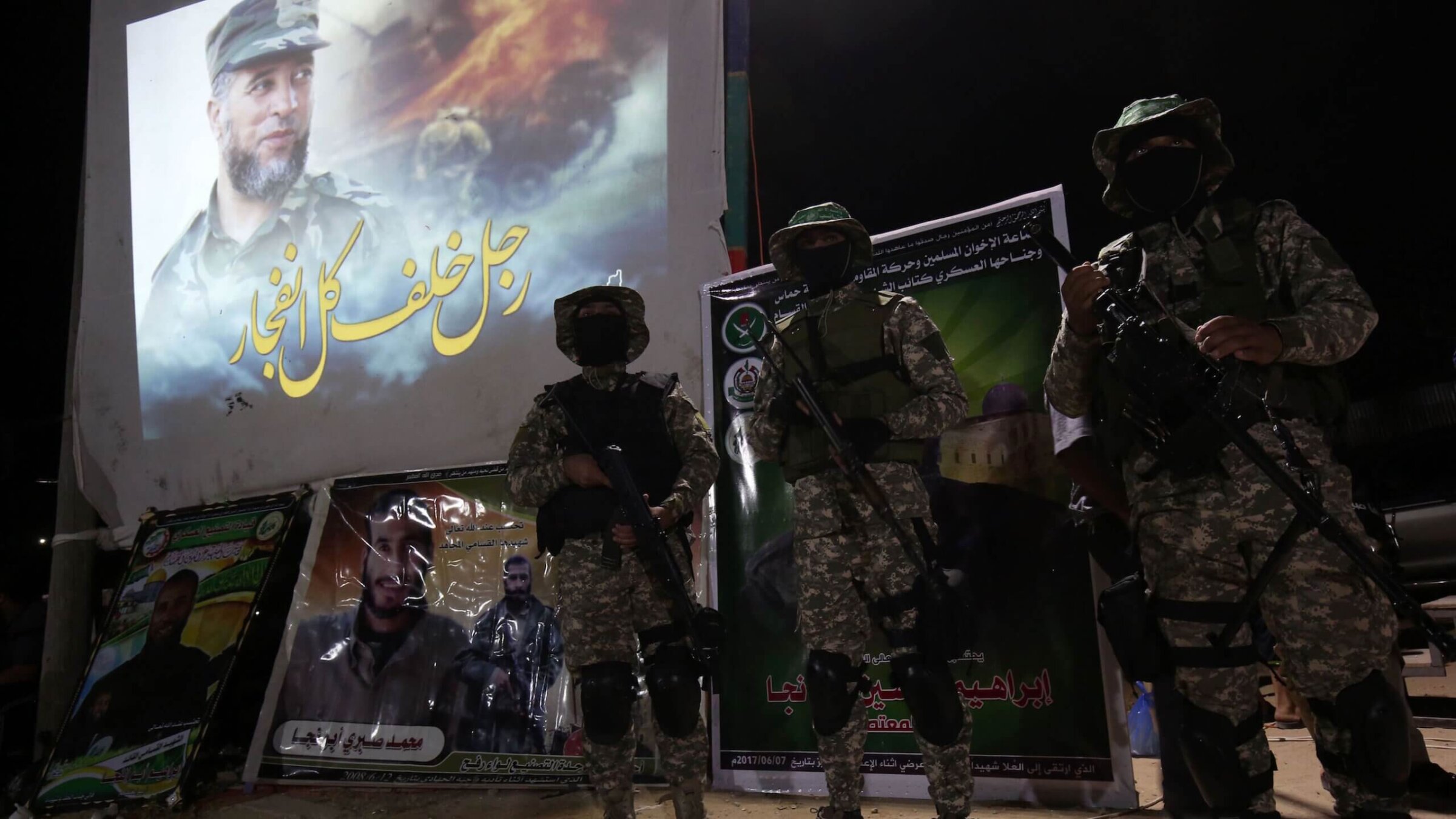Can we please stop arguing about whether Hamas gunmen are ‘militants’ or ‘terrorists’?
Words do matter. But this kind of hair-splitting is a waste of energy in this devastating war

Fighters from the Ezzedine al-Qassam Brigades, the armed wing of the Palestinian Hamas movement, attend a memorial service in the Gaza Strip in 2017. Photo by Said Khatib/AFP via Getty Images
Hamas is a terrorist organization, so deemed by the U.S. since 1997. The group’s unprecedented, coordinated, barbaric assault on Israel last weekend was a terror attack. The gunmen who slaughtered young revelers at an all-night dance party in the desert and kidnapped grandparents and babies from their kibbutz homes are terrorists. Full stop.
They are also militants.
“Militants” and “terrorists” are not opposites. In fact, they share some synonyms in online thesauruses — radical, fanatic — so might be considered synonyms by the transitive property.
Nor is “militant” some kind of compliment. Words related to it in online dictionaries include “rioter,” “offensive,” “zealot.” One says the term “refers to individuals or groups who engage in armed conflict or political violence in pursuit of a specific cause or ideology.”
That’s Hamas. In this case, the ideology is Islamism — and antisemitism. As the group’s charter makes clear, its aim is to wipe the state of Israel off the map and kill Jews.
The same site says terrorist “refers to those who use violence, often targeting civilians, to create fear and panic for political, religious or ideological purposes.” That’s also Hamas.
It is both. Which is why we at the Forward and other news outlets use both terms to describe Hamas and the people who kill for it. What they are not are “freedom fighters” or “heroes.”
Also: Who cares?
This debate — which is exploding on social media as well as in my inbox and at Jewish communal events — is a distraction from the much, much more serious issues confronting us right now.
Our family in Israel are racing from shiva house to shiva house, with bodies waiting for burial in refrigerated trucks because the chevra kedisha cannot prepare them fast enough. Humanitarian crisis is gripping Gaza as hundreds of thousands try to heed Israel’s warning to flee the north ahead of a ground invasion.
Here at home, college campuses are ablaze: Jewish students subjected to heinous antisemitic harassment, Palestinian advocates doxxed, university leaders contorting themselves to navigate the crisis while maintaining principles of free speech.
Most importantly, some 199 innocent people — including babies and grandparents and people with grave injuries — are being held hostage by the militant terrorists of Hamas. And the prospect of a Jewish and democratic Israel and a free and sovereign Palestine ever peacefully sharing the land where both our peoples have roots dating back centuries has never felt more dim.
We have work to do, and it doesn’t involve the dictionary.
This fake dispute over “terrorists” vs. “militants” is part of a much broader war of words engulfing universities, newsrooms and social-media platforms these days. Some of these battles, particularly around race and gender, are substantive and important frontiers for societal change.
But in the Israeli-Palestinian context, armchair activists frustrated by the stagnation of the situation have opened another front by inventing what I call “conflict code.” They’ve replaced the plain English meaning of certain words and phrases with distorted, loaded meanings.
Only in conflict code is there some kind of profound difference between “retaliate” and “respond” (I’m fairly fluent and still cannot tell you what it is). Only conflict-code combatants care whether you call the high-tech fence that separates Israel from the Gaza Strip a “border” — which it technically is not because Gaza is not a country — especially now that hordes of Hamasniks have breached that border fence to massacre Israelis.
A decade ago, the International Press Institute issued “Use With Care,” a glossary of some 75 terms to avoid in describing the Israeli-Palestinian conflict. Some of these are important: The separation barrier Israel constructed after the deadly Second Intifada is not an “apartheid wall,” for example. It’s wrong to refer to “the government of Tel Aviv,” since Israel’s prime minister, president and Parliament all sit in Jerusalem, its capital.
I tripped into “conflict code” shortly after I started my tour as Jerusalem bureau chief of The New York Times. I described Hebron as a “hotly disputed city,” not realizing that “disputed” is a term that right-leaning Zionists use instead of “occupied” to describe the West Bank. My email blew up — even though the article also stated clearly that “Israel began occupying the West Bank in 1967.”
Hebron is in fact both occupied and hotly disputed. Just like Hamasniks are both militants and terrorists.
Last week, I got an incensed email from a woman who identified herself as a progressive Democrat. “They are terrorists,” she wrote. “Please name them for what they are.” I was stunned because the column she was responding to had called them terrorists. I went back to check; it used the words terrorism, terrorist or terror attack seven times, “militants” three.
For what it’s worth, I checked Google on Sunday morning, and there were 253 million results for “Hamas terrorists” and 120 million for “Hamas militants.”
Words matter. I’ve spent my career using words to help people understand our complicated, sad, maddening world. I understand, deeply, that the Israeli-Palestinian conflict is one of narratives that are intrinsic to many people’s identities, and that only makes it all more emotional.
But we can no longer afford to fight over words, especially words whose meanings are as similar as “militant” and “terrorist.” Too much is at stake.





















